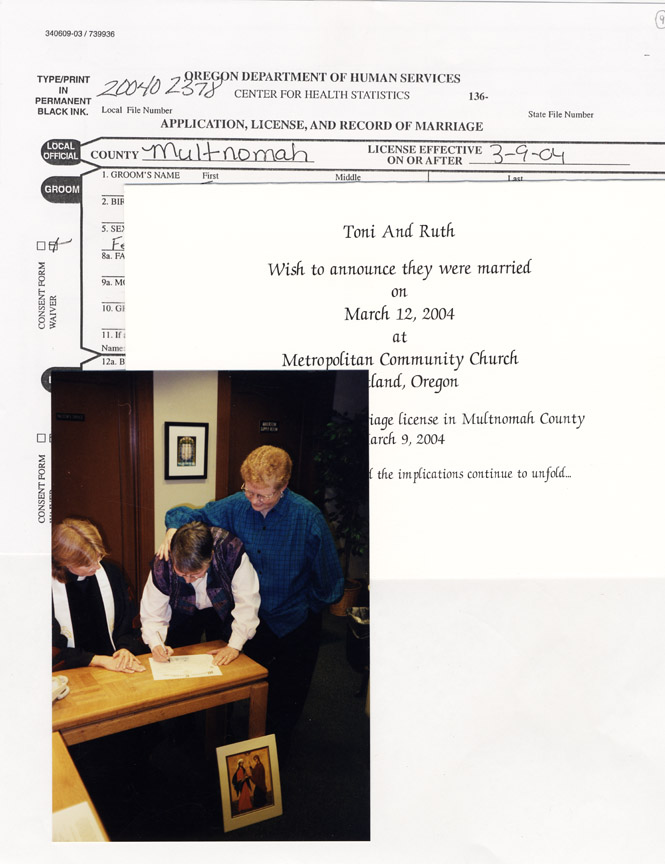- Catalog No. —
- bc006594
- Date —
- March 12, 2004
- Era —
- 1981-Present (Recent Oregon History)
- Themes —
- Government, Law, and Politics
- Credits —
- Multnomah County (Or.) wedding album project records, Coll 62, Oregon Historical Society Research Library
- Regions —
- Portland Metropolitan
- Author —
- Multnomah County, Oregon
Same-Sex Marriage
This marriage license, photograph, and wedding announcement document the marriage of Toni Tortorilla and Ruth Broeski on March 12, 2004. On Wednesday, March 3, 2004, Multnomah County began to issue marriage licenses to same-sex couples. Four Multnomah County commissioners - Lisa Naito, Maria Rojo de Steffey, Serena Cruz, and chair Diane Linn - made the decision based on a legal opinion written by County Attorney Agnes Sowle, but they were not joined by the fifth commissioner, Lonnie Roberts.
Agnes Sowle's legal opinion concluded that denying marriage licenses to same-sex couples was a violation of Article I, Section 20, of the Oregon Constitution, which states: "No law shall be passed granting any citizen or class of citizens privileges, or immunities, which, upon the same terms, shall not equally belong to all citizens." Sowle reasoned that the state's Constitution preempted its legal code, which defines marriage as "a civil contract entered into in person by males at least 17 years of age and females at least 17 years of age." The code later refers to married couples as those who "take each other to be husband and wife."
In response to Sowle's opinon and the controversial issuing of marriage licenses, Oregon State Attorney General Hardy Myers issued a legal opinion on March 12, 2004. It stated that the granting of marriage licenses to same-sex couples was a violation of Oregon state law; Myers agreed, however, that the law may violate the state Constitution. Myers concluded that it was unclear whether the Oregon State Supreme Court would interpret the marriage statute as being in violation of the Constitution.
In an effort to clarify the ambiguous legal opinions and to put an end to same-sex marriage licenses, the Oregon Family Council, a Christian advocacy group, organized the Defense of Marriage Coalition and began collecting signatures to put a constitutional amendment before voters in the fall election. On November 2, 2004, Oregon voters passed Measure 36, which amended the state constitution with the following: "It is the policy of Oregon, and its political subdivisions, that only a marriage between one man and one woman shall be valid or legally recognized as a marriage."
In April 2005, the Oregon State Supreme Court nullified the approximately 3,000 same-sex marriages that had been performed with Multnomah County marriage licenses. In 2007, the State Legislature took up the debate over granting the benefits and responsibilities of marriage to same-sex couples through legal civil unions or domestic partnerships.
Further reading:
Christa Orth, "Brothers and Sisters (and Everyone in Between): Sexuality and Class in the Pacific Northwest, 1970-1995," (M.A. Thesis, University of Oregon, 2002).
Written by Eliza Canty-Jones, © Oregon Historical Society, 2007.
